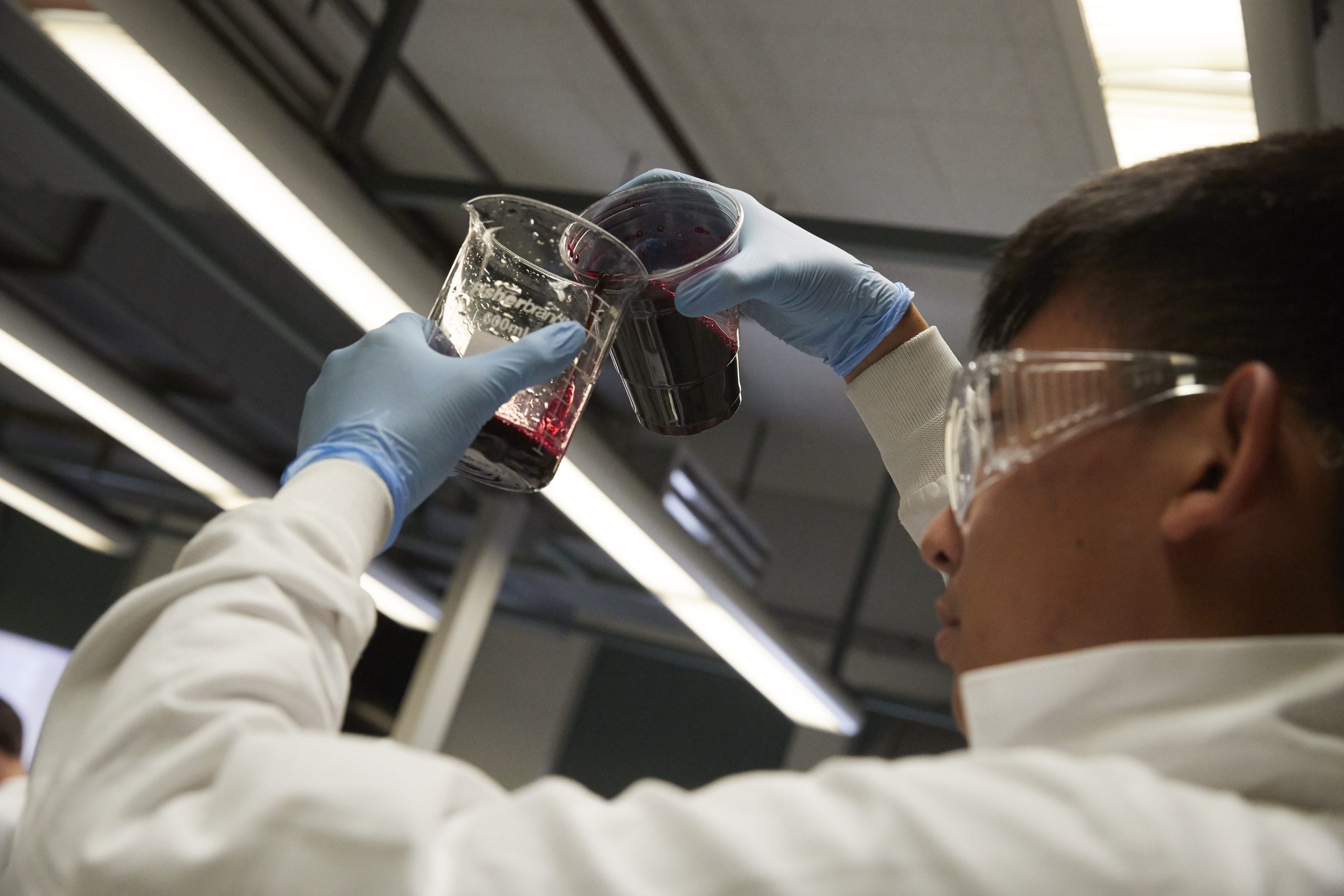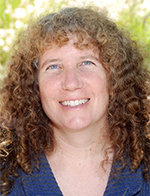Propose and conduct your own experimental research project

Use scientific methodologies and techniques to explore current research topics
The Applications of Nanoscience Summer Institute is designed for high school students with a background in chemistry and a desire to learn the basics of pursuing a viable, scientifically-sound technology and bringing it to market. As a model, students will explore a few important applications of nanoscience while also learning the basics of reviewing existing scientific literature, design-thinking, and entrepreneurship. They will then go through the process of proposing a product in pursuit of bringing their nanotechnology-based idea to market, and perform preliminary research to validate the science behind their idea.
During this two-week program, students have the unique opportunity to explore questions similar to those currently investigated by the scientific community. The program involves the combination of vigorous scientific methodologies and techniques with business projects that are both fun and exciting. At the end of this course, students will demonstrate their newfound knowledge by working on a team project to experience the process of team research and pitching a business and a product to technology investors.
Applications of Nanoscience Program Overview
Applications are reviewed and admission to the program is granted on a rolling basis starting February 15th. Applying at your earliest convenience is highly recommended.
The program has application requirements for admission. Eligible applicants who successfully submit all requirements will be reviewed and notified via email of an admission decision within 3 weeks.
Applicants are required to provide the following during the online registration process:
- An unofficial transcript from grade 9 to present reflecting a cumulative GPA of 3.2 or higher
- If your school transcript utilizes a different grading system, please submit your transcript as is. If available, please attach a translation/equivalency guide.
- INTERNATIONAL STUDENTS: If you are an international student, a transcript refers to your complete secondary academic record. To learn more about converting your grades into a US-based GPA, please click here.
- If your school has a translation/equivalency guide, please also include it with your transcript. If you do not have a translation/equivalency guide, please still submit your most up-to-date transcript as is for staff to review.
- Value statement: At the time of registration, ALL applicants will be prompted to submit a few short sentences reflecting on their pursuit of participation in a UCLA Precollege Summer Institute. Please note that students are strongly discouraged from relying on ChatGpt/AI tools for their application responses and are encouraged to submit original and authentic answers.
- Students are required to have completed a high school chemistry course. An additional strong science foundation in physics and biology is highly recommended.
- Please prepare two short essays with the following prompts before starting your registration form:
- In 250 words or less, describe why you are interested in science and technology and how participating in Applications of Nanoscience will help you achieve your academic and/or personal goals.
- In 250 words or fewer, how did you hear about nanoscience and nanotechnology, and what is your current understanding of this topic? Is there anything you are particularly interested in learning more about?
A residential track is available as well as a commuter track for Applications of Nanoscience.
The residential track is ONLY available to students who will be 17 years of age or older by June 23, 2025. NO EXECPTIONS are made to this eligibility requirement.
All residential precollege programs feature scheduled non-curricular evening and weekend activities that all students are expected to participate in. The nature of these scheduled activities is at the sole discretion of the individual academic department offering the program, and are not operated by UCLA Summer Sessions. To learn more about when your selected program will host such activities, please consult the schedules for each program, or contact the department in question directly: ctanimoto@cnsi.ucla.edu
Most of our residential precollege programs will hold check-in on the Sunday before the start of the program between 4-6pm, and hold check-out the Saturday after the final day of class at 11am. Please contact the department in question directly to confirm check-in and check-out times: ctanimoto@cnsi.ucla.edu
For more information on UCLA housing precollege programs, please see the Housing for Minors page.
As an alternative to the residential track of the Applications of Nanoscience Summer Institute, UCLA is also offering a commuter option. There is NO on-campus housing available for the commuter program through the summer institute or UCLA Summer Sessions. Additionally, please note that only students aged 17 and older as of June 23rd, 2025 are eligible to sign a housing contract, and not all program dates correspond to when contracts are available. Students interested in exploring this option should review information at UCLA Summer Housing.
Participants of the Applications of Nanoscience Summer Institute commuter program must commute to the UCLA campus each day of the program. Specific location information (e.g. classroom) will be provided to enrolled students closer to the start of the program.
Parking
Summer Sessions parking permits will be available on a first-come, first-served basis. Students have the option to purchase a summer term permit or a daily permit.
Coursework
Chemistry 8; 3 units
Grading
Students will be graded on a Pass/No Pass basis upon completion. See University Credit, Grades and Transcripts for more information about academic credit.
In order to successfully complete the program, students must not have more than 1 excused absence.
UCLA Summer Sessions Summer Scholars Support
Qualified students attending grades 9th – 11th in Spring 2025 in the state of California may be eligible for Summer Scholars Support, a need- and merit-based scholarship offered by the UCLA Summer Sessions Office. Students must be 15 years old by the first day of Summer Sessions 2025 on June 23rd in order to participate in a Precollege Summer Institute and/or apply for Summer Scholars Support. A limited number of full and partial scholarships are available to support enrollment in SCIP/eSCIP, one Summer Course, or a Precollege Summer Institute.
Summer 2025 deadline to apply: March 15.
Session A – Residential:
Program Dates: July 6, 2025 – July 19, 2025
Application deadline: June 6, 2025
Enrollment deadline: June 27, 2025
Session A – Commuter:
Program Dates: July 7 – July 18, 2025
Application deadline: June 13, 2025
Enrollment deadline: July 4, 2025
Session B – Residential:
Program Dates: July 27, 2025 – August 9, 2025
Application deadline: June 6, 2025
Enrollment deadline: July 18, 2025
Session B – Commuter:
Program Dates: July 28, 2025 – August 8, 2025
Application deadline: June 13, 2025
Enrollment deadline: July 25, 2025
Program Eligibility:
10th – 12th grade in Spring 2025*
*All participants must be at least 15 years of age (or 17 for residential sessions) by the first day of Summer Sessions 2025 on June 23rd, no exceptions allowed.
The schedule and syllabus are subject to change. Enrolled students will be given updated materials closer to the program start date.
Fees and Payment Info
The program fee includes the unit fees for the UCLA coursework offered as part of the program and thus varies by UC student status. In addition to the program fee, students are assessed other campus and administrative fees during the summer. This is a summary of fees that commonly apply to the selected student type.
Actual tuition and fees are subject to change by the University of California. Visit the fees, payment, and financial aid section for important disclaimer, as well as more details on fees, payment instructions, and information on delinquency, refunds, and financial aid.
RESIDENTIAL PROGRAM FEES:
The program fees listed in the selection are for the commuter version only. The program fee also includes the cost of UCLA Housing. The following are the program fees for the Residential version.
- High School Student = $4560
- Incoming UCLA Student = $4242
- Incoming UC Student = $4242
All other fees listed will remain the same for the Residential version.
Meet your instructors
Sarah Tolbert
ProfessorSarah Tolbert received her Bachelor’s degree in Chemistry from Yale University. She then receiver her Ph.D. in Chemistry from UC-Berkeley, studying the structure, stability, and electronic properties of nanometer sized clusters with Prof. A. Paul Alivisatos. She was then a Postdoctoral Scholar at UCSB, researching the synthesis, characterization, and physical and structural properties of new inorganic/organic composite and mesoporous materials with Prof. Galen D. Stucky.
In 1997, Sarah joined the UCLA family as an Assistant Professor of Chemistry and currently serves in both the Chemistry and Materials Science and Engineering Departments. Her current research interests include self-organized nanoscale materials for electronic, magnetic, optical, and structural applications; nanomaterials for energy, including electrochemical charge storage and solar energy harvesting; semiconducting polymers; polymer templated nanoporous materials, including supercapacitors and strain engineering magnetic materials; new ultrahard and ultra-incompressible materials and functional materials through solution phase self-assembly.

Applications of Nanoscience Summer Institute FAQ
This is a two-week program in which students learn what it means to be a working scientist in the first week, then propose and conduct their own experimental research project during the second week.
We expect students to have a strong foundation in chemistry and biology (honors/AP chemistry is highly encouraged, but not required).
There is a final research presentation.
No, teams will be assigned.
No, all topics will be given during the program.
Yes, students should bring a laptop*.
*Please reach out to the program instructor if you have an issue with technological accessibility.
Still have questions? Check out the general Summer Institutes FAQ.

